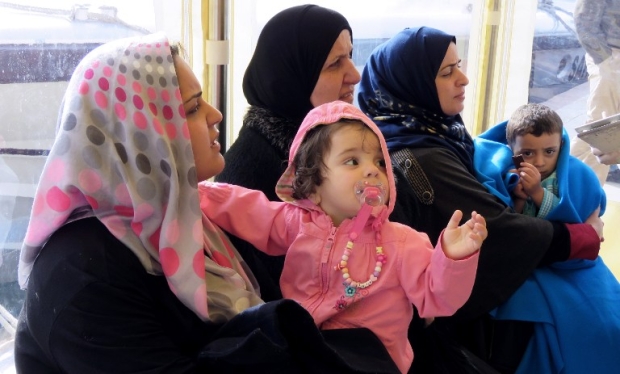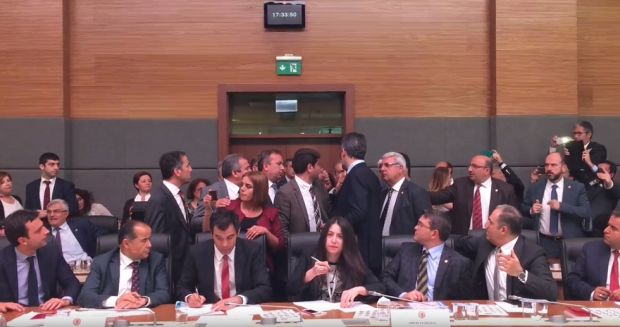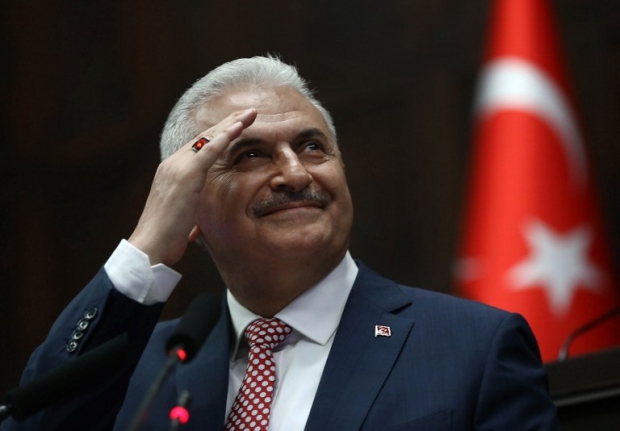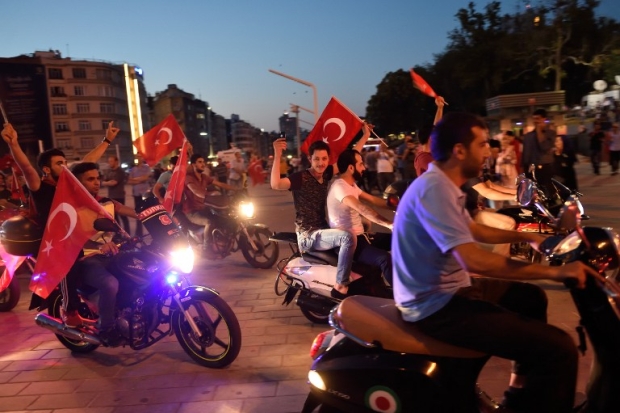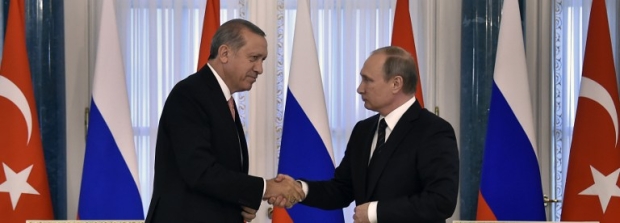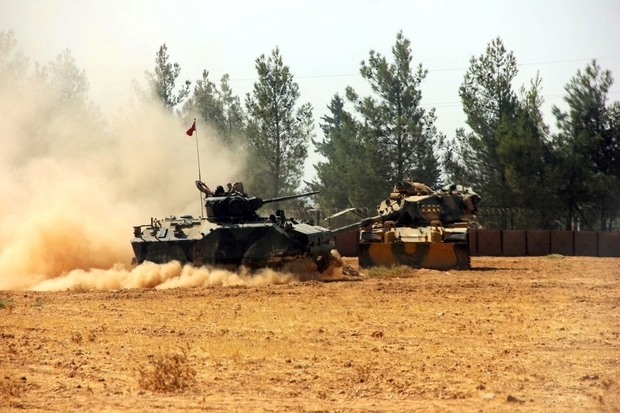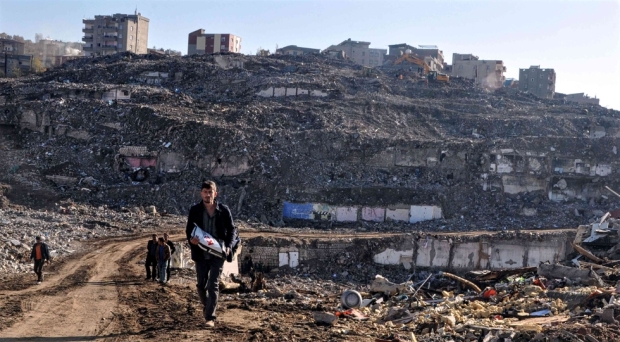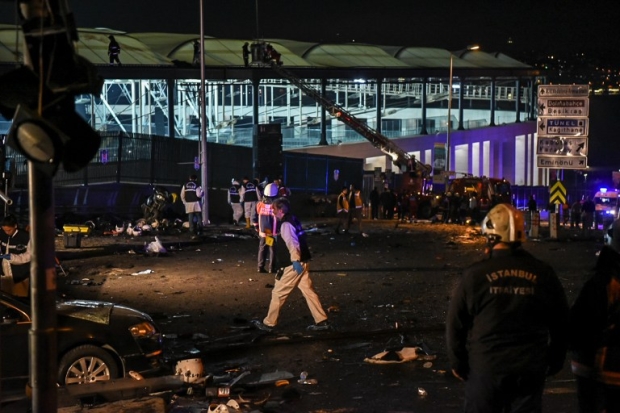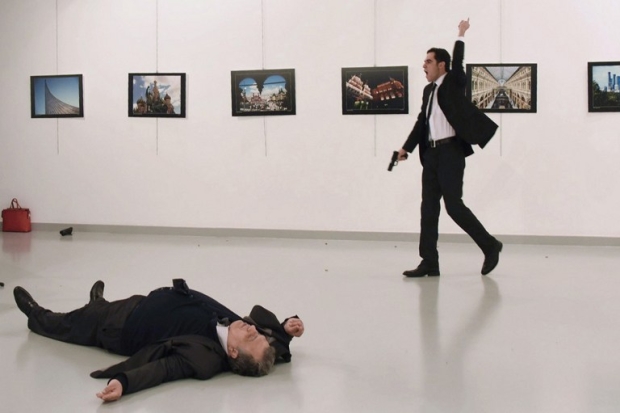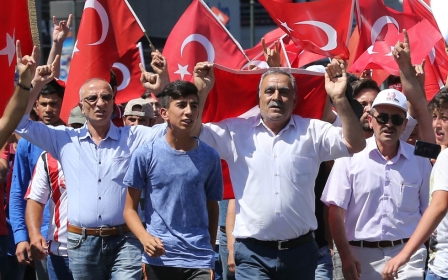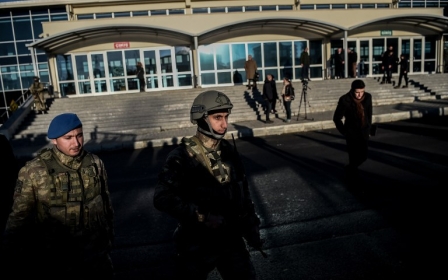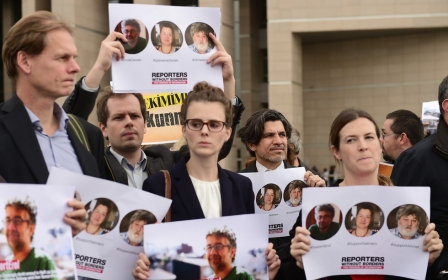Turkey's turbulent year: A coup, bombings, mass arrests and parliament punch-ups
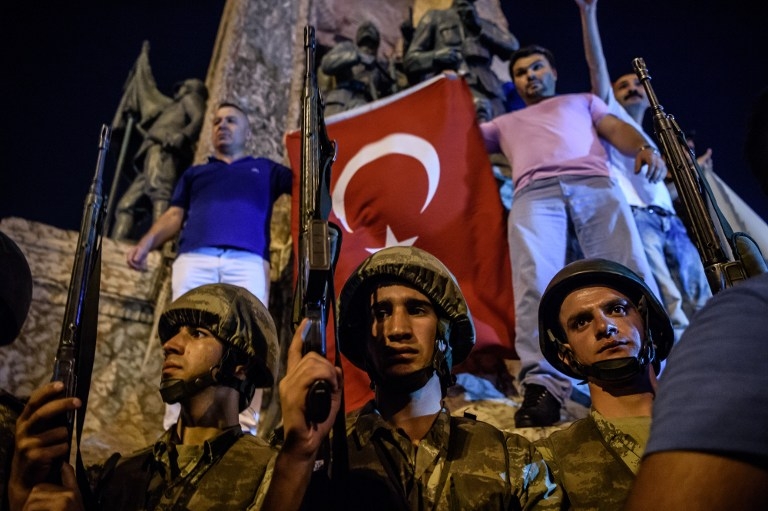
ISTANBUL, Turkey – Turkey dominated headlines in a year of 24 bombings that killed at least 385 people, political turmoil, fist-fights in parliament, the sacking of a prime minister, strained ties with traditional Western allies, the assassination of the country's Russian ambassador and a crackdown on independent media with the near-total silencing of free speech.
All of that was topped, however, by the 15 July attempted coup, which proved to be the most monumental event of the year for Turkey, driving thousands of people into the streets in defiance as rebel soldiers seized control of bridges in Istanbul and their jets bombed parliament in a failed attempt to shake President Recep Tayyip Erdogan's grip on power.
A crackdown followed as the government blamed the coup on supporters of the exiled US-based preacher Fethullah Gulen. More than 100,000 people were sacked or suspended from their jobs, more than 36,000 arrested, hundreds of media outlets and non-governmental associations shuttered and more than 550 businesses confiscated by the state.
On the domestic political front, the biggest issue was the attempt by the ruling Justice and Development Party (AKP) to introduce an executive presidency system of governance, which would hand unprecedented power to Erdogan. Opponents are concerned it is the biggest step yet toward the establishment of one-man rule with no checks and balances.
The fate of MPs from the pro-Kurdish Peoples' Democratic Party (HDP), with at least 10 of them languishing in prison, and the party itself – which refuses to condemn attacks by the Kurdistan Workers' Party (PKK), considered a terrorist group by Ankara – was also high on the agenda and is likely to occupy headlines in 2017 as well.
The past 12 months proved to be another tough year for residents in Turkey's Kurdish-majority southeast. Constant clashes between Turkish security forces and the PKK saw villages, towns and cities reduced to rubble as neither side seemed to worry about collateral damage.
The near-total exclusion from the conflict region of independent media meant that the corroboration of stories of brutalities perpetrated by each side has proved to be difficult.
On the foreign policy front, relations with Ankara's primary allies, the US and the EU, neared a breaking point. Turkey and the US are at loggerheads over the role of Syrian-Kurdish groups in Syria's civil war and the possible non-extradition of Gulen.
Animosity between Turkey and the EU reached such levels in 2016 that Ankara started accusing the bloc of harbouring and assisting "terrorists". The EU accuses Turkey of straying from the path of democracy and universal human rights principles.
The assassination of Andrey Karlov, Russia's ambassador in Ankara, on 19 December shocked the world, and concerns are growing over the future shape and direction of recently repaired Russo-Turkish relations.
With about 82 journalists in jail, Turkey also became the world's biggest jailer of journalists, according to the Committee to Protect Journalists, a US-based media freedom monitor.
In spite of traditionally boasting a vibrant media sector, few independent and critical voices are left amid the various forms of pressure recently brought to bear upon dissenting voices. Various forms of control over internet access have also impeded the public's access to information.
'Headed for a wall'
No wonder many Turks are hoping for a calmer and more peaceful 2017. Yet prospects appear bleak as the underlying causes for most of 2016's incidents remain unresolved. The country's economy also looks set to face testing times.
Yusuf Kanli, a veteran journalist and political commentator, told Middle East Eye he feared 2017 would be so bad that Turkey would look back upon a "crazy" 2016 as a good year.
"Most probably we will miss 2016, given what looks to be in store for 2017. Nothing is well in any area," said Kanli. "We are headed towards a wall at full speed and we don’t even know how strong that wall is."
The defining moment of 2017 for Turkey, in Kanli’s view, will be the expected referendum on shifting to an executive presidency system of governance. He also said the entire process leading up to the referendum will be a crucial period.
But Mazhar Bagli, a sociologist and former AKP parliamentarian, predicted a more stable 2017 for Turkey.
"Both domestic and international forces attempted everything they could in 2016 to thwart the political conservatism the AKP represents, whether it was through the coup attempt, terror attacks or other things,” Bagli told MEE.
"Academic analyses and my personal conviction tell me that 2017 will be less aggressive for Turkey if only because Turkish leaders and society as well will be able to draw on past experiences and deal with various situations," said Bagli.
He agreed with Kanli that the expected referendum on shifting to an executive presidency would be the most significant event on the political calendar for 2017.
Bagli said regardless of the outcome, the referendum result will be a watershed moment for the country in 2017.
He said a yes vote would mean a change in the system of governance. A no vote, however, could lead the AKP to call an early general election, since it would then need to prove that it still had a public mandate to stay in power.
January12: A bombing in the heart of Istanbul’s tourist district Sultanahmet kills 11 and injures 15. The attack carried out by Islamic State (IS) group militants deals a severe blow to an already rattled tourism sector.
February
17: A car bombing in central Ankara targeting Turkish military personnel leaving work kills 26 and wounds 61. The Kurdistan Freedom Falcons (TAK), which the government says is part of the terrorist-designated PKK, claims responsibility.
March
13: A car bomb in central Ankara kills 37 and injures 125. TAK claims responsibility.
19: A suicide bomber targets tourists on Istanbul’s iconic Istiklal Avenue, killing four and wounding 36. IS claims responsibility.
20: A controversial migrant deal between Turkey and the EU comes into effect. The deal means both sides will attempt to stem the illegal and hazardous flow of primarily Syrian refugees into Europe in exchange for financial assistance and the promise of visa-free travel to Europe for Turkish citizens. The deal marked a high point in Turkish-EU relations in recent years. Ties have neared a breaking point since.
ANALYSIS: Erdogan plays game of bluff with EU, and cannot lose
21: Nevruz, the arrival of spring celebrated mostly by the Kurdish population in Turkey, passes without any major incidents in spite of an ongoing conflict between security forces and Kurdish militants in southern parts of the country.
31: Attack targeting police officers kills seven police and hurts 27 people. The PKK is held responsible.
April
8: Turkish and Israeli officials say they are looking to restore frayed ties between the countries after talks in London.
27: An attack near Bursa's Ulu Mosque wounds 13 and is blamed on TAK.
27: Fighting breaks out in parliament as tensions spill over and MPs from the ruling Justice and Development Party and the pro-Kurdish Peoples' Democratic Party (HDP) come to blows.
May
1: An attack in Gaziantep blamed on IS kills three policemen and wounds 22 people.
2: More brawling in parliament between AKP and HDP MPs, with one parliamentarian dislocating his shoulder during a fight.
12: An attack carried out by the PKK in Diyarbakir’s historic and beleaguered Sur district kills four and injures eight.
20: Parliament passes a motion stripping MPs of parliamentary immunity from prosecution. The move is believed to be directed at HDP MPs. President Recep Tayyip Erdogan subsequently signs the bill into law on 7 June.
22: Ahmet Davutoglu, the prime minister, announces his resignation from his position at an extraordinary congress of the AKP. He is replaced by Binali Yildirim, previously transportation minister and fierce Erdogan loyalist.
READ: The fall of Turkey's Davutoglu
Most observers agree that Davutoglu was forced to resign because he refused to play second fiddle to Erdogan and sought to preserve the powers of the prime minister. Davutoglu, a former foreign minister, became prime minister in August 2014 after Erdogan had moved on to the presidency.
June
7: A car bomb targets police in Istanbul's old city killing 11 and wounding 36. TAK claimed responsibility.
8: A car bomb explodes in the southern Mardin province killing four people and wounding 34. The PKK claims responsibility.
26: Turkey and Israel reach a deal to normalise ties. The countries had downgraded relations since 2011, after the 2010 Mavi Marmara-led aid flotilla headed for blockaded Gaza was raided by Israeli commandos in international waters, killing nine Turkish citizens.
READ: Ruling party’s support base enraged at restoration of ties with Israel
27: Erdogan apologises for the downing of a Russian jet on 24 November 2015, paving the way for restoring ties between Ankara and Moscow. Erdogan's office plays down the apology, saying it was merely an expression of regret.
28: Istanbul's main airport, Ataturk, is attacked by three people accused of being IS-linked, leaving 45 people dead and 237 injured.
July
11: International rights watchdog Human Rights Watch calls on Turkish state to stop blocking NGOs from visiting southeast Turkey.
READ: Turkey must stop blocking NGO access to war-torn southeast: HRW
15: Factions within the Turkish military attempt a coup at about 22:30 local time. Tanks patrol the streets, fighter jets buzz low overhead. Parliament in Ankara is bombed. Millions sit transfixed in fear in front of their TV screens fearing the worst. As mosques across the country started blaring out the Sela (a call of distress during Ottoman times) and Erdogan appears on television using the Facetime app, people take to the streets to put down the attempted coup.
READ: Anatomy of a coup: One night in Turkey, and the battle for democracy
By morning the coup plotters are mostly defeated. Authorities accuse former Erdogan ally-turned-foe, the US-based Turkish preacher Fethullah Gulen, and his followers of orchestrating the coup attempt. All four parties in parliament condemn the coup attempt.
READ: How an iPhone defeated the tanks
21: A three-month state of emergency is announced, granting the government expanded powers that make it easier to arrest suspects and to hold them without access to legal representation. The state of emergency also enables the government to rule by decree and bypass parliament. Officials, including the prime minister, Binali Yildirim, vow the expanded powers will only be used against the Gulen movement. The state of emergency marks the start of a massive crackdown including not just Gulenists, but also media and other groups opposed to the AKP.
24: Human rights organisation Amnesty International says it has "credible evidence" that coup suspects are being tortured in Turkish prisons. The Turkish justice minister slams the report as baseless.
READ: Families of detained soldiers sleep in Turkey's streets to get answers
25: The Turkish prime minister says plans to draft a new constitution are back on the agenda in the wake of the coup attempt. Although he says the AKP will work with all parties in parliament, it is clear from the outset that the HDP and Republican People's Party (CHP) will reject any change that involves switching to an executive presidency system of governance.
August
1: The PKK claims responsibility for an attack in Bingol that kills seven police officers and wounds two.
9: Erdogan meets his Russian counterpart Vladimir Putin in St Petersburg for the first time since the downing of the Russian jet, marking the start of the process to mend ties. It is also Erdogan’s first foreign trip since the failed coup attempt. Erdogan has made clear his displeasure with his traditional Western allies for their perceived lack of support during the early hours and days following the coup attempt.
ANALYSIS: Turkey and Russia use coup to thaw relations
10: The PKK claims an attack in Mardin that kills three people and hurts 30.
16: A PKK bomb attack in Diyarbakir kills seven people, five of them police officers.
17: A PKK bomb attack in Van kills four and injures 72.
18: A PKK attack in Elazig kills five people and injures 217.
21: A suicide bomber, believed to be linked to IS, attacks a wedding in Gaziantep, killing 54 people and wounding 94.
24: Turkey launches a military incursion into northern Syria with the stated intention of clearing its border areas of terrorist threats emanating from Syria. The incursion, called Euphrates Shield, is spearheaded by Free Syria Army rebels and aided by Turkish special forces, tanks, artillery and air support. Officials say it is an open-ended operation and will continue until a 5,000-square-kilometre area leading to the Turkish border is cleared of both IS and the Democratic Union Party’s Peoples' Protection Units (YPG) elements.
Turkey and its traditional ally, the US, see relations strained because of the latter's reliance on the YPG as its primary ground force in the fight against IS. Turkey says the PYD and YPG are Syrian extensions of the PKK and will not permit them to connect cantons they control in Syria, thereby cutting Turkey off from other groups. To date at least 30 Turkish soldiers have been reported killed in the operation.
READ: Turkish tanks enter Syria, as Erdogan targets IS and Kurdish militants
26: A PKK bomb attack in Sirnak kills 11 policemen and injures 78 people.
26: The third bridge spanning the Bosphorus Strait and connecting Istanbul's European and Asian sides is officially inaugurated.
September
3: Turkey opens a new front in its Syria incursion, sending tanks into al-Rai.
11: Jailed PKK leader Abdullah Ocalan renews his call for peace talks between PKK and the Turkish state.
READ: PKK leader calls for peace talks in first statement for two years
12: A car bomb explodes in front of the AKP provincial office in Van injuring 53 people. The PKK claims responsibility.
October
3: The government announces that the state of emergency will be extended for another three months effective 19 October. Erdogan in a speech says the state of emergency will be renewed for a year if need be and that it is no one’s business, especially Europe’s, to interfere.
6: A bomb blast in the Istanbul suburb of Yenibosna injures 10 people. The PKK is blamed for the attack.
11: Devlet Bahceli, chairman of the right-wing Nationalist Movement Party (MHP), signals his party will back a proposal to switch to an executive presidency system, providing a major boost to Erdogan and the AKP. The MHP has become a strong backer of the AKP following the coup attempt and fully backs many of Erdogan's positions, including the reinstatement of the death penalty.
READ: Turkish nationalists signal support for shift to presidential system
31: The offices of Cumhuriyet newspaper, a secular, Kemalist and centre-left publication that is one of the few remaining independent voices, are raided and 10 of its writers and staff arrested. They remain in prison. The government says the arrests are a legal process concerning propaganda for the PKK and the Gulen movement.
ANALYSIS: Turkey's press freedom, and the hypocrisy of Gulen supporters
The government also says the raids pertain to irregularities in voting that occurred when the trust that owns the newspaper chose the paper's executive board.
November
1: Turkey deploys reinforcements including tanks and other military hardware along its border with Iraq as the offensive to retake Mosul from IS continues. Ankara warns Baghdad that it will not idly stand by if the local population in and around Mosul is targeted by Shia militias. Tensions are high between Ankara and Baghdad as the Iraqi government vetoes Turkish participation in the Mosul offensive and demands that Turkey remove a military camp set up in Bashiqa.
ANALYSIS: Turkey, an occupying power or Iraq's saviour from IS?
4: Raids are carried out on the homes of HDP MPs. Nine MPs including the party's co-chairs are arrested. The raids are said to be launched because the MPs had ignored court summonses, and their subsequent arrests are for cases against them involving propaganda for and acting on behalf of a terrorist organisation.
ANALYSIS: The end of democracy in Turkey?
4: A car bomb in Diyarbakir kills 11 people and injures more than 100. The government blames the PKK for the attack.
14: Curfew on Sirnak, one of the hardest hit towns in the fighting between the PKK and security forces, is partially lifted.
READ: How Turkish army and Kurdish fighters reduced town to ruins
24: The European Parliament votes overwhelmingly to suspend Turkey’s EU accession negotiations. The vote is purely symbolic but is slammed by Turkey. Turkish officials say Turkey places no significance on the vote and it just shows the EU's animosity in targeting Turkey instead of backing it during turbulent times. Erdogan later responds by threatening to open Turkey’s borders and let the nearly three million refugees in Syria head for Europe.
24: A car bomb in front of the Adana governor's office kills two and injures 33 people. TAK claims responsibility.
December
1: Israel's ambassador to Turkey Eitan Naeh arrives to take up his post, marking the restoration of ties between the two countries. A few days later on 9 December, an Istanbul court throws out a case trying four Israeli commanders in absentia for the Mavi Marmara raid.
2: The UN special rapporteur on torture, Nils Melzer, says there is no evidence of systematic torture in Turkish prisons of coup-related suspects after a week-long visit. He says his team has heard testimonies of ill-treatment in the days just after the coup attempt in unofficial holding centres. He does, however, say that there are cases of ill-treatment regarding detainees who are deemed PKK sympathisers.
10: The AKP submits a package of constitutional changes to parliament. The package will look to shift the country to an executive presidency system and hand the president expanded powers. The AKP has vowed to hold a referendum in the spring or early summer even if it passes with an absolute majority of 367 votes in parliament. The package would need at least 311 votes to go to a referendum. The AKP has 316 MPs and its backer, the MHP, has 41.
10: A twin bombing in front of the Besiktas football team’s stadium in central Istanbul kills 44 and injures at least 150 people. The targets of the attack are crowd-control police stationed around the stadium to keep rival fans apart. TAK claims responsibility.
12: Another fist fight breaks out in parliament between AKP and HDP MPs as tensions simmer.
12: Economic data shows Turkey's GDP contracted 1.8 percent in the third quarter of 2016. It was the first decline in quarterly growth since 2009. The Turkish lira is also under severe strain, declining in value since November.
17: A car bomb in the Anatolian city of Kayseri targets off-duty soldiers on a public transit bus, killing 14 soldiers and injuring 55 people. TAK claims responsibility.
19: The Russian ambassador to Turkey, Andrey Karlov, is gunned down by a 22-year-old police officer at an art exhibit in Ankara. The gunman is shot dead. Analysts say understanding his motives and affiliations will go a long way towards determining the future of Russo-Turkish relations.
READ: Death of an ambassador: Where next for Russian-Turkish relations?
20: The Eurasia tunnel, an underwater tunnel for automobiles running under the Bosphorus Strait linking the European and Asian sides of Istanbul, is officially opened.
New MEE newsletter: Jerusalem Dispatch
Sign up to get the latest insights and analysis on Israel-Palestine, alongside Turkey Unpacked and other MEE newsletters
Middle East Eye delivers independent and unrivalled coverage and analysis of the Middle East, North Africa and beyond. To learn more about republishing this content and the associated fees, please fill out this form. More about MEE can be found here.




